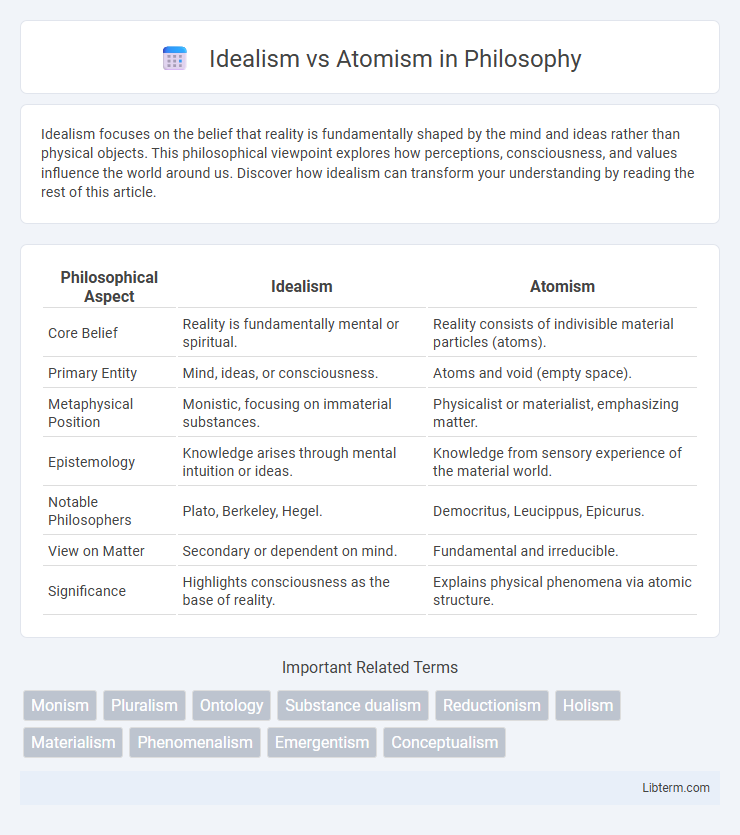Idealism focuses on the belief that reality is fundamentally shaped by the mind and ideas rather than physical objects. This philosophical viewpoint explores how perceptions, consciousness, and values influence the world around us. Discover how idealism can transform your understanding by reading the rest of this article.
Table of Comparison
| Philosophical Aspect | Idealism | Atomism |
|---|---|---|
| Core Belief | Reality is fundamentally mental or spiritual. | Reality consists of indivisible material particles (atoms). |
| Primary Entity | Mind, ideas, or consciousness. | Atoms and void (empty space). |
| Metaphysical Position | Monistic, focusing on immaterial substances. | Physicalist or materialist, emphasizing matter. |
| Epistemology | Knowledge arises through mental intuition or ideas. | Knowledge from sensory experience of the material world. |
| Notable Philosophers | Plato, Berkeley, Hegel. | Democritus, Leucippus, Epicurus. |
| View on Matter | Secondary or dependent on mind. | Fundamental and irreducible. |
| Significance | Highlights consciousness as the base of reality. | Explains physical phenomena via atomic structure. |
Understanding Idealism: Core Concepts
Idealism centers on the belief that reality is fundamentally mental or immaterial, positing that consciousness and ideas shape existence rather than physical substances. Key concepts include the primacy of mind, the notion that material objects only exist as perceptions within consciousness, and the emphasis on the unity of experience. Philosophers such as George Berkeley and Immanuel Kant contributed to the development of idealism by arguing that knowledge and reality are intrinsically linked to mental processes and perceptions.
Defining Atomism: A Philosophical Overview
Atomism, a foundational philosophy in metaphysics, asserts that the universe consists of indivisible, discrete units called atoms, which combine to form all matter and phenomena. Originating with ancient thinkers like Democritus and Leucippus, atomism challenges idealism by denying the primacy of ideas or consciousness, instead emphasizing physical substance and mechanistic interactions. This materialist perspective underpins scientific inquiry by treating observable properties as emergent from atomic behavior rather than abstract mental constructs.
Historical Origins of Idealism and Atomism
Idealism, originating primarily from Ancient Greek philosophers like Plato, asserts that reality is fundamentally mental or immaterial, emphasizing the primacy of ideas or consciousness. In contrast, Atomism traces back to Leucippus and Democritus, proposing that the universe consists of indivisible atoms moving in a void, laying early foundations for materialism and modern science. These contrasting origins highlight a philosophical dichotomy between reality as thought-based versus matter-based, influencing metaphysical debates throughout history.
Key Thinkers in Idealism vs Atomism
Key thinkers in Idealism include Georg Wilhelm Friedrich Hegel, who emphasized the reality of the mind and ideas as the foundation of existence, and Immanuel Kant, who argued that knowledge is shaped by innate cognitive structures. In contrast, Atomism centers on thinkers like Democritus and Epicurus, who proposed that the universe consists of indivisible atoms moving in a void, forming the basis of all matter and phenomena. These contrasting views highlight the debate between reality as shaped by mental constructs versus material components.
Fundamental Differences Between Idealism and Atomism
Idealism posits that reality is fundamentally mental or spiritual, emphasizing consciousness as the primary substance, whereas Atomism asserts that reality consists of indivisible, material particles that form the basis of all physical existence. Idealism centers on ideas and perceptions as the true essence, while Atomism relies on physical atoms and their interactions to explain phenomena. The fundamental difference lies in Idealism's prioritization of mind over matter, contrasting with Atomism's emphasis on tangible, discrete units as the foundation of reality.
Impact of Idealism and Atomism on Science
Idealism influenced science by emphasizing the role of consciousness and ideas in shaping reality, leading to explorations in quantum mechanics and the philosophy of mind. Atomism contributed to the foundation of modern physics and chemistry through its assertion that matter consists of discrete, indivisible particles, guiding empirical research and experimental methods. The interplay between idealism and atomism continues to shape scientific paradigms, driving debate on the nature of reality and the limits of observation.
Idealism vs Atomism in Modern Philosophy
Idealism in modern philosophy posits that reality is fundamentally mental or spiritual, emphasizing consciousness as the primary substance, as seen in the works of Hegel and Berkeley. Atomism argues that the universe consists of indivisible particles or atoms, grounding existence in physical matter, a perspective advanced by thinkers like Democritus and later scientific materialists. The debate shapes metaphysical discussions on the nature of reality, influencing epistemology, ontology, and the philosophy of mind in contemporary thought.
Critiques of Idealism and Atomism
Critiques of Idealism highlight its reliance on subjective perception, arguing that it struggles to adequately explain the existence of an objective reality independent of the mind. Atomism faces criticism for oversimplifying complex phenomena by reducing them to indivisible units, often neglecting the relational and contextual aspects of matter. Both philosophies encounter challenges in addressing the interplay between mental and physical realms, prompting ongoing debates in metaphysics regarding the nature of existence and knowledge.
Real-World Applications of Both Philosophies
Idealism shapes education and leadership by emphasizing the importance of ideas, values, and mental constructs in personal development and ethical decision-making. Atomism underpins scientific research and technology by focusing on the fundamental components of matter and reality, enabling advancements in physics, chemistry, and material science. Both philosophies influence cognitive science, with Idealism fostering models of consciousness and perception, while Atomism drives empirical investigation of neural mechanisms.
Future Perspectives: Idealism and Atomism in Contemporary Thought
Future perspectives on idealism and atomism in contemporary thought emphasize their evolving roles in fields such as quantum physics, cognitive science, and metaphysics. Idealism's focus on consciousness and mental constructs intersects with emerging theories in artificial intelligence and virtual reality, while atomism's emphasis on fundamental particles remains foundational to advancements in nanotechnology and material sciences. Integrating both views offers promising frameworks for understanding reality's complexity and the interplay between mind and matter.
Idealism Infographic

 libterm.com
libterm.com